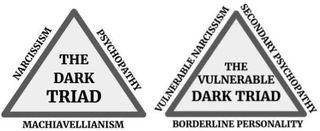Narcissism
6 Signs That You Might Be a Vulnerable Narcissist
If these signs ring true with you, you might have a vulnerable dark personality.
Posted March 31, 2020 Reviewed by Kaja Perina
Key points
- Vulnerable narcissism is far more subtle and harder to pin down than its grandiose counterpart.
- Common traits of vulnerable narcissism include an introverted personality and being prone to feeling shame.
- They may also thrive on attention and blame others for their mistakes.

In its clinical form, narcissism is a personality disorder. According to the fifth edition of The Diagnostic and Statistical Manuel of Mental Disorders (DSM-5), in order for an unusual personality to be regarded as disordered in the clinical sense, it must give rise to a pattern of thought and behavior that is so problematic that the afflicted person is unable to function in society. For example, they may be unable to follow rules or hold a job.
In common parlance, “narcissism” doesn’t refer to the clinical disorder. Rather, it depicts a troublesome personality that causes other people great distress yet doesn’t significantly compromise the afflicted person's ability to function. Narcissism, in this "subclinical" sense, can be thought of as a personality disturbance (or distortion) as opposed to a disorder, that is, narcissism, in its subclinical manifestation, is a psychological condition that falls short of meeting the diagnostic criteria for the corresponding clinical personality disorder but which nonetheless can create havoc in interpersonal relationships.
The narcissist's typical style of interaction tends to cause great distress to family members and friends and sometimes even strangers. But the narcissist is very often in denial about (or perhaps blissfully ignorant of) the suffering she causes others and the very fact that her personality is warped.
One reason for this blindspot is that the narcissist's pattern of thought and behavior, which can elicit great distress and emotional hurt in others, doesn't seem to cause the narcissist any discomfort, not anything she can access or cognitively process anyway.
Another reason behind the narcissist's typical lack of self-insight turns on the fact that the condition can emerge in two different forms: grandiose and vulnerable narcissism. Grandiose narcissism is characterized by extraversion, low neuroticism and overt expressions of feelings of superiority and entitlement, whereas vulnerable narcissism is marked by introspective self-absorbedness, high neuroticism, and alternating feelings of excessive pride and deep shame.

Grandiose narcissism is one of the traits in the dark triad of personality, the other two being psychopathy, and Machiavellianism. Vulnerable narcissism has found its way into a different (but related) triad of personality, the so-called vulnerable dark triad, which is the constellation of the three vulnerable dark personalities: vulnerable narcissism, secondary psychopathy, and borderline personality.
Vulnerable narcissism is far more subtle and harder to pin down than its grandiose counterpart. Yet it may be the most common of the two subtypes in younger generations (Millennials, Gen Z, and Gen alpha).
Although vulnerable narcissism is hard to spot, due to its subtle and somewhat unfamiliar manifestation, it nonetheless is associated with its own highly distinctive patterns of thought and behavior. Here are 6 of its most common characteristics. If most of them ring true with you, then you may have vulnerable narcissistic tendencies.
1. You have an introverted personality. If you are a vulnerable narcissist, you are just as convinced that you are above most others as your grandiose counterpart, but you have a much more introverted personality. According to the Big Five of personality, introverts tend to come across as unapproachable, unfriendly or cold, negative, unassertive, and as having a need for alone time. If you are a vulnerable narcissist, then you are far more likely to sit in the corner at the office party than being surrounded by people eager to hear your anecdotes. Indeed, you may be the exception to the proverb that no (wo)man is an island.
2. You have a neurotic personality. If you are a vulnerable narcissist, you are likely to be high in neuroticism—another dimension of personality on the Big Five model. Neuroticism is characterized by the following six facets: anxiousness/panic-proneness, depressiveness, hostility, self-consciousness, immoderation, and vulnerability. If you are both high in neuroticism and self-centered, you are likely to worry a great deal about your perceived status: your youthful look, your career prospects, your savings, your relationship status, or anything else you take to matter to your perceived superior status.
3. We won't say it out loud, but (psst!) you thrive on attention and accolade. You want to amount to something in the eyes of the world. You are therefore in constant search of "natural" opportunities for self-promotion. You are particularly eager to take on tasks that are bound to be noticed by others yet you do what you can to avoid agreeing to do things that tend to go unnoticed. If your completion of the attention-worthy task doesn't give you the accolade you were looking for, you will then go to great length to hint at (in roundabout ways) how hard you have been working or how much you have achieved, yet look unfazed and maybe even surprised when your colleagues finally acknowledge your "hard work" or "significant achievements."
4. You are prone to feelings of shame. Your self-image is split into a positive self-image that is characterized by excessive pride and a negative self-image that is ridden with shame. This split makes you hypersensitive even to gentle feedback and constructive criticism. When receiving only positive feedback, you are able to keep the negative shame-filled self-image hidden from your own conscious mind. But when you perceive someone's feedback on your work as a criticism of you, your negative self-image pushes the image of pride off the stage, and this triggers intense feelings of self-disgust and self-blame, and inevitable shame.
5. You blame others for your mistakes. You rarely accept responsibility for your actions, because when things go wrong you tend to feel that it isn't your fault. Rather, other people or circumstances are to blame for your mishaps. If you break a promise to a friend, it's because your boss is too demanding of your time. If you consistently fail to show up on time for work, it's because your roommate takes over your joint bathroom for at least three hours and fifteen minutes each morning. On the rare occasion where you do accept blame for breaking promises or for being tardy at work, it's because you feel cornered. But your acceptance of blame in this scenario is completely void of any heart-felt guilt, regret, or remorse.
6. You take but rarely give. You are always looking to receive more than you give. You may make more money than all of your family-members combined, yet crash on your kid sister's futon or live off of your grandparent's savings. You don't typically bother with the company of other people but on those rare occasions where you join your coworkers for a drink Friday after work, you don't ever really feel that it's your turn to buy a round, not even after your having happily accepted and gulped down three or four specialty cocktails, all paid for by your coworkers—even the intern and the receptionist chipped in. If against all odds, you do decide to reciprocate, it's probably because you think that doing so could benefit you in the long run.
Facebook image: Dmytro Zinkevych/Shutterstock




